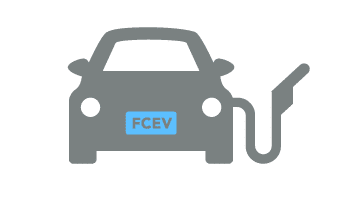
All-Electric Vehicles (EVs)
EVs use only electricity stored in a large battery to power their electric motor for a range of 80-335 miles. Quiet, powerful, and efficient, most EVs achieve over 100 mpg equivalent while producing zero tailpipe pollution. Many of the most affordable, shorter range EVs can replace a gasoline car in multiple car households, while the longer range ones could replace a gasoline car even for a one car household.

Plug-in Hybrid Electric Vehicles (PHEVs)
PHEVs have both an electric motor and an internal combustion engine. A PHEV has an electric range of 13-53 miles, and operates like an EV for most daily driving. A gasoline engine provides energy once the battery is exhausted, allowing longer trips while achieving great hybrid gas mileage. Many PHEV drivers go for weeks without using a drop of gas, but have range confidence due to the back-up gasoline engine.

Hybrid Electric Vehicles (HEVs)
HEVs have an internal combustion engine along with batteries that capture and store energy that would normally be wasted when the vehicle is driven. Unlike plug-in hybrid electric vehicles, drivers don’t plug in an HEVs to charge the vehicle’s batteries. Instead, a HEV uses the gasoline engine and regenerative braking to charge up the vehicle batteries that help power the car (usually when people are driving at slower speeds). Using a mix of gasoline and electricity provides greater fuel efficiency and significantly reduces tailpipe emissions, but HEVs are not quite as clean or efficient as plug-in electric vehicles. HEVs have both the range and power of conventional gasoline and diesel vehicles.

Fuel Cell Electric Vehicles (FCEVs)
These vehicles use compressed hydrogen gas for fuel. The hydrogen gas is combined with air in a special fuel cell to create electricity. The electricity created with the fuel cell is used to power the vehicle’s electric motor. FCEVs are zero emission vehicles, which means that no pollution comes out of their tailpipe (just like pure battery electric vehicles). Drivers can travel more than 300 miles on a single tank of hydrogen, and it takes about 3 to 5 minutes to refuel – about the same amount of time it takes to fill up with gasoline or diesel. There are currently 35+ hydrogen refueling stations in operations across California, with plans to expand the network outside of the state. Toyota, Honda, Mercedes-Benz and Hyundai are already offering FCEVs for lease and sale. Audi, Chevy, Nissan, and others have announced plans for new FCEVs in the coming years.
All images on this page from Drive Electric Minnesota